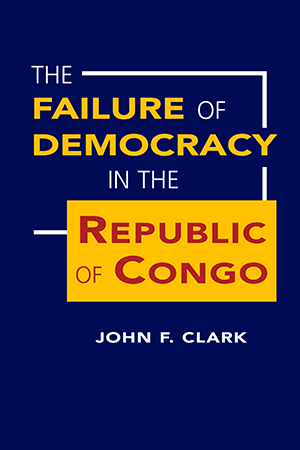John F. Clark
Why did the democratic experiment launched in the Republic of Congo in 1991 fail so dramatically in 1997? Why has it not been seriously resumed since then? In tackling these complex questions, John Clark provides a thorough analysis of more than fifteen years of Congolese politics.
Clark explores a series of logical hypotheses regarding why democracy failed to take root in Congo, moving from political culture to economic performance, ethnoregional identities, French foreign policy, the role of militias, and institutional design. He also discusses the country's present "electoral authoritarian" regime. His conclusions shed light not only on the nature of Congolese politics, but also on the utility of the scientific approach to understanding the social world.
John F. Clark is professor of politics and international relations at Florida International University. His publications include The African Stakes of the Congo War and Political Reform in Francophone Africa (coedited with David Gardinier).
"Clark has provided us with a sure-footed account of Congolese politics, a carefully considered discussion of the most important factors determining the failure of Congolese democratization efforts, a perceptive critique of the ways that the complexities of such processes elude current scholarship on democratization, and a useful guidepost to promising directions of future research."—Nelson Kasfir, Perspectives on Politics
"Both refreshing and timely.... Clark's agency-structure "pendulum" approach lends itself to some superb analyses.... Without question his work will appeal to social scientists for its rigorous analyses and to policymakers for its practical findings."—Ch. Didier Gondola, African Studies Review
"An] excellent analysis.... Clark does a good job of disentangling the country's complicated ethnic divisions and shifting ethnic alliances." —Nicolas van de Walle, Foreign Affairs
"In seeking answers to a single, not-so-simple question—why has Congo's democratic experiment since the 1990s failed?—Clark sets a high standard for qualitative social science research into structural and agency dynamics.... Highly recommended."—Choice
"Clark provides one of the most detailed and theoretically informed accounts of recent Congolese politics of any that can be found. He also brings a welcome new realism to the study of democracy."—William S. Reno, Northwestern University
"This valuable study not only chronicles one of the most interesting examples of 'democratic failure' in Africa, but also provides insight into the politics of one of the less well known, but strategically important, African states."—Victor T. Le Vine, Washington University in St. Louis








